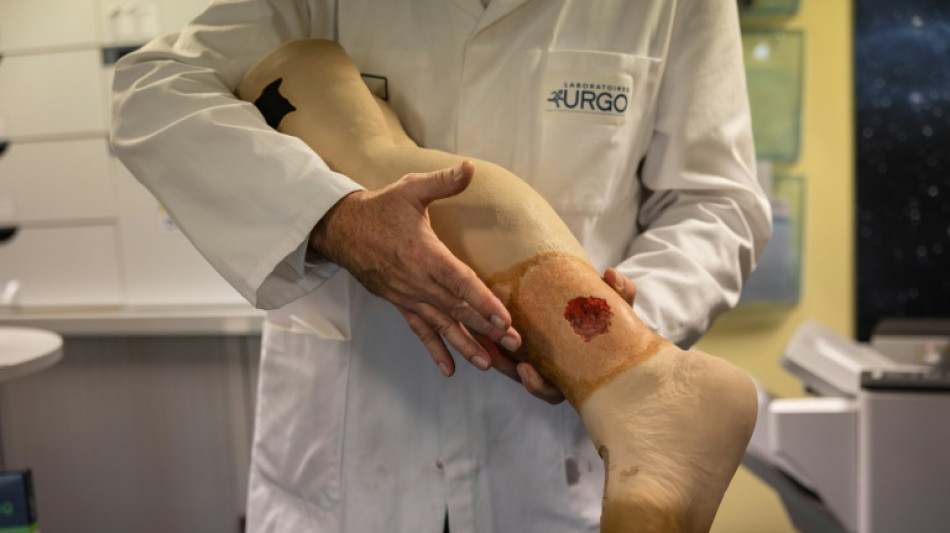
-
 Shark bites surfer in Australian state's fourth attack in 48 hours
Shark bites surfer in Australian state's fourth attack in 48 hours
-
North Korea's Kim sacks vice premier, rails against 'incompetence'
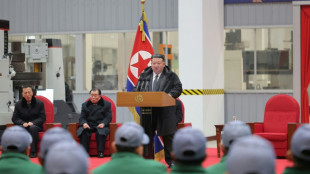
-
 Spain mourns as train crash toll rises to 40
Spain mourns as train crash toll rises to 40
-
'Very nervous' Keys makes shaky start to Australian Open title defence
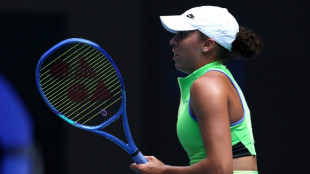
-
 Vietnam leader promises graft fight as he eyes China-style powers
Vietnam leader promises graft fight as he eyes China-style powers
-
Dad-to-be Ruud ready to walk away from Australian Open
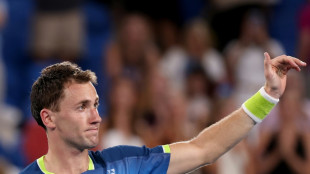
-
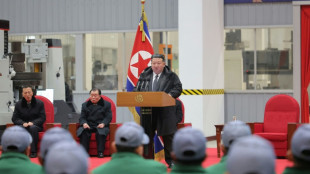 North Korea's Kim sacks senior official, slams 'incompetence'
North Korea's Kim sacks senior official, slams 'incompetence'
-
Farewells, fresh faces at Men's Fashion Week in Paris

-
 'I do not want to reconcile with my family' says Brooklyn Peltz Beckham
'I do not want to reconcile with my family' says Brooklyn Peltz Beckham
-
EU leaders take stage in Davos as Trump rocks global order
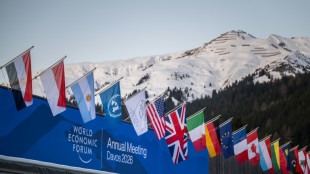
-
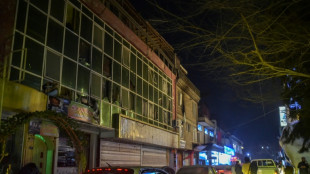 Blast at Chinese restaurant in Kabul kills 7
Blast at Chinese restaurant in Kabul kills 7
-
Warner hits 'Sinners' and 'One Battle' tipped for Oscar nominations

-
 Colombian paramilitary-turned-peace-envoy sentenced over atrocities
Colombian paramilitary-turned-peace-envoy sentenced over atrocities
-
Gilgeous-Alexander leads Thunder in rout of Cavaliers

-
 Seahawks blow as Charbonnet ruled out for rest of season
Seahawks blow as Charbonnet ruled out for rest of season
-
Kostoulas stunner rescues Brighton draw after penalty row

-
 Man Utd greats tell Martinez to 'grow up' as feud rumbles on
Man Utd greats tell Martinez to 'grow up' as feud rumbles on
-
LeBron James' All-Star streak over as starters named

-
 Allies tepid on Trump 'peace board' with $1bn permanent member fee
Allies tepid on Trump 'peace board' with $1bn permanent member fee
-
Ninth policeman dies in Guatemala gang riots, attacks

-
 Man City's Foden to play through pain of broken hand
Man City's Foden to play through pain of broken hand
-
Milan Fashion Week showcases precision in uncertain times

-
 Public media in Europe under unprecedented strain
Public media in Europe under unprecedented strain
-
Africa Cup of Nations refereeing gets a red card

-
 Tributes pour in after death of Italian designer Valentino
Tributes pour in after death of Italian designer Valentino
-
Bills fire coach McDermott after playoff exit: team

-
 Chile wildfires rage for third day, entire towns wiped out
Chile wildfires rage for third day, entire towns wiped out
-
Valentino, Italy's fashion king who pursued beauty at every turn, dies at 93

-
 France PM to force budget into law, concedes 'partial failure'
France PM to force budget into law, concedes 'partial failure'
-
Allies tepid on Trump 'peace board' with $1bln permanent member fee

-
 'My soul is aching,' says Diaz after AFCON penalty miss
'My soul is aching,' says Diaz after AFCON penalty miss
-
Ex-OPEC president in UK court ahead of corruption trial

-
 Iran warns protesters who joined 'riots' to surrender
Iran warns protesters who joined 'riots' to surrender
-
Stop 'appeasing' bully Trump, Amnesty chief tells Europe

-
 Central African Republic top court says Touadera won 78% of vote
Central African Republic top court says Touadera won 78% of vote
-
Trump tariff threat has global investors running for cover

-
 Spectacular ice blocks clog up Germany's Elbe river
Spectacular ice blocks clog up Germany's Elbe river
-
Trump says not thinking 'purely of peace' in Greenland push

-
 Syria's Kurds feel disappointed, abandoned by US after Damascus deal
Syria's Kurds feel disappointed, abandoned by US after Damascus deal
-
Man City sign Palace defender Guehi

-
 Under-fire Frank claims backing of Spurs hierarchy
Under-fire Frank claims backing of Spurs hierarchy
-
Prince Harry, Elton John 'violated' by UK media's alleged intrusion

-
 Syria offensive leaves Turkey's Kurds on edge
Syria offensive leaves Turkey's Kurds on edge
-
Man City announce signing of defender Guehi

-
 Ivory Coast faces unusual pile-up of cocoa at export hubs
Ivory Coast faces unusual pile-up of cocoa at export hubs
-
Senegal 'unsporting' but better in AFCON final, say Morocco media

-
 New charges against son of Norway princess
New charges against son of Norway princess
-
What is Trump's 'Board of Peace'?

-
 Mbappe calls out Madrid fans after Vinicius jeered
Mbappe calls out Madrid fans after Vinicius jeered
-
Russians agree to sell sanctioned Serbian oil firm


Dressing 'revolution' seeks artificial skin for burn victims
Far from the humble sticking plaster, medical firms and researchers are seeking to create the "ultimate dressing" -- artificial skin they hope will revolutionise the treatment of severe burns.
For the last 18 months, researchers from the French firm Urgo have been working towards achieving this Holy Grail of wound treatment, which would save serious burn victims from the painful and repeated skin grafts they currently endure.
The 100-million-euro ($106,000-million) "Genesis" project hopes to have a product ready by 2030.
Guirec Le Lous, the president of Urgo's medical arm, told AFP that it is a "crazy" project.
"Are we capable of designing artificial skin in a laboratory? No one in the world has succeeded," he said.
Inside Urgo's laboratory in Chenove, near the eastern French city of Dijon, living cells are being chilled before they can be cultivated.
"You have to be able to recreate all the functions of skin," including protecting against external threats and regulating the temperature, Le Lous said.
It must also be relatively easy to make, because artificial skin must be "available for all and at the right price," he said, without revealing the exact technology or type of cells Urgo is using.
Urgo, a family-owned business since 1880, has long made dressings for chronic wounds such as diabetic foot ulcers and venous leg ulcers.
"Since the 2000s, we have worked on materials that will correct healing problems: dressings have become intelligent, interactive with wounds, allowing them to perform better," Urgo's research director Laurent Apert said.
He called the change "a revolution".
- Silver bullet -
Urgo is far from alone in pushing the boundaries of what dressings can do.
Researchers at the University of South Australia have developed a new kind of dressing that knows when to release nanoparticles of silver, which can break down antibiotic-resistant bacteria.
"Our treatment is unique in that it capitalises on the anti-bacterial properties of silver, but avoids over-exposure, by only activating when infection in present," lead researcher Zlatko Kopecki said in a statement.
This makes the dressing "a much safer and effective treatment for children," he added.
Children suffer almost half of burn injuries worldwide, most of them aged between one to five years old, according to research using the World Health Organization's Global Burn Registry.
- 'Night and day' -
Another new technique does away with the idea of dressing altogether.
For a product from French startup VistaCare Medical, patients put their affected leg into a large device which never touches their wound.
Instead the chamber controls the humidity, temperature and other aspects important to healing.
"There is no more dressing. The idea is to put the wound in an enclosure, in a sterile air, VistaCare Medical president Francois Dufay said.
"With this system, we provide the wound with what it needs, at the right time."
VistaCare Medical's device is currently used in around 20 French hospitals, but next year the firm plans to apply for approval in the United States for a product to be used in the home.
The new developments have shaken up the world of wound healing, long a neglected area of medical research.
Isabelle Fromantin, who heads the wounds and healing research unit at the Curie Institute in Paris, said that "compared to 20 years ago, it's night and day in terms of wound care".
Along with her team, Fromantin has developed dressings that reduce the odours from necrotic wounds seen in some cancers.
However she said that not everything can be achieved by new technologies -- healing is a process that varies from person to person, depending on their age and health.
"Believing that a dressing will heal you all by itself is utopian," she said.
C.Kovalenko--BTB



